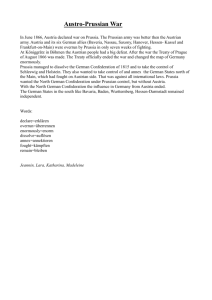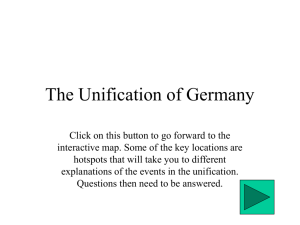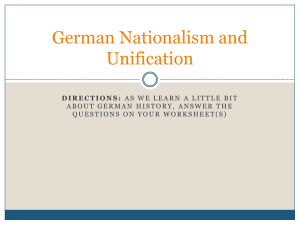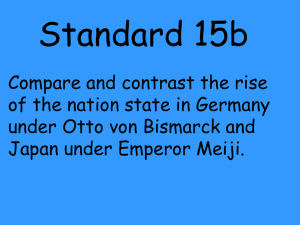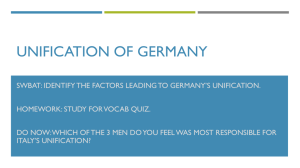The Unification of Germany - SHS-Euro
advertisement
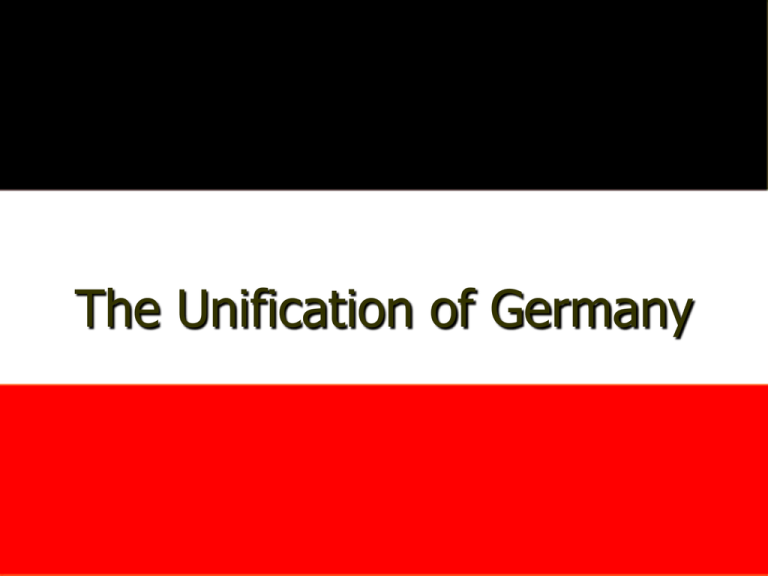
The Unification of Germany The construction of a united Germany was the single most important political development in Europe between 1848 and 1914. • It transformed the balance of economic, military • • • and international power. The method of its creation largely determined the character o the new German state. Germany was united by the conservative army, the monarchy and the prime minister of Prussia, whose chief motives was the out maneuvering of German liberals A unified Germany sought for two generations by German liberals, was actually achieved for most the most illiberal of reasons. After the failure of the Frankfurt Assembly to achieve German Unification in 1848-1849, German nationalities focused on Austria and Prussia as the only two states powerful enough to dominate German affairs. Zollverien • Formed by Prussia in 1834. It was a German customs union,. • It eliminated tolls on rivers and roads among the member states. • Stimulated trade and added to the prosperity of its member states, especially Prussia. • All German states joined except Austria. Frankfurt Assembly 1848 • We cannot conceal the fact that the whole German question is a simple alternative between Prussia. We need a powerful ruling house… Prussia desired German unity in order to supply the deficiencies of her own power. Already Prussia is Germany in embryo. She will “merge” with Germany… Johann Gustav Droysen: Speech to the Frankfurt Assembly, 1848 King William I In 1861, William became King of Prussia. In the usual Hohenzollern tradition, his first concern was the army. In 1860 he proposed to enlarge the army, to increase the number of officers and to extend the period of conscription from two years to three years. The Prussian Parliament Created by the Constitution of 1850, the Prussian parliament refused to approve the necessary taxes to enlarge the army. The liberals who dominated the body, sought to avoid placing additional power in the hands of the monarchy. Call for help In September 1862, William I turned for help to the person who, more than any other single individual, shaped the next thirty years of European history: Otto von Bismarck, the new Prime Minister of Prussia Otto von Bismarck and the Art of Realpolitik • • • • • • • Junker and Prussian patriot Conservative Opposed parliamentary government Understood that Prussia, later Germany, must have a strong industrial base Opportunist not a gambler Waged war when all other diplomatic alternatives had been exhausted and when he was reasonably sure that all military and diplomatic advantages were on his side Politically, he trusted action and power not ideas Bismarck and Realpolitk •The politics of reality. •It describes tough power politics with no room for idealism There was a time when the Junker’s thought Bismarck a traitor. The king was actually afraid of him. He made friends with liberals, democrats and even socialists and in turn made enemies of them. First he made wars, and then insisted upon peace. Alliances were passing conveniences. The enemy today might be a friend tomorrow. He took advantage of situations as they emerged. “...blood and iron” In 1862, Bismarck resubmitted the army appropriations bill with a passionate appeal to his liberal opponents in parliament. “Germany is not looking to Prussia's liberalism but to her power…the great questions of the day will not be decided by speeches and majority decisions – that was the mistake of 1848-1849 – but by blood and iron.” Parliament not impressed rejected the bill again. For the next five years, Bismarck went ahead and collected taxes and reorganized the army anyway. From 1862 to 1866, he governed Prussia by largely ignoring Parliament. Bismarck had to find a way to attract popular support away from the liberals and toward the monarchy and army. He therefore set about uniting Germany through the conservative institutions of Prussia, The Danish War - 1864 Schleswig-Holstein were two duchies that were ruled by the kings of Denmark without being a part of Denmark itself. Populations were a mix of Danish and German. In 1863, the Danish parliament made a move to incorporate both duchies into Demark. Austria and a Prussia went to war and easily defeated Denmark. Bismarck was maneuvering Austria into war with Prussia Results of Danish War Austria was put in charge of Holstein and Prussia in charge of Schleswig. Bismarck then moved to mend diplomatic fences. 1. Gained Russian sympathy by supporting the 1863 suppression of a Polish revolt 2. Persuaded Napoleon III to promise neutrality in an Austro-Prussian conflict 3. Promised Italy it would gain Venetia if it attacked Austria in an Austro-Prussian conflict. Because of the policy of Vienna (Congress of Vienna, 1815), Germany is clearly too small for us both (Prussia and Austria); as long as an honorable arrangement concerning the influence of each in Germany cannot be concluded and carried out, we will both plough the same disputed acre, and Austria will remain the only state to whom we can permanently lose or from whom we can permanently gain…I wish only to express my conviction that, in the not too distant future, we shall have to fight for our existence against Austria and that is not within our power to avoid that, since the course of events in Germany has n other solution. Bismarck to Minister von Manteuffel, 1856 Austrian-Prussian War - 1866 • Constant tension had arisen over the administration of Schleswig and Holstein • Bismarck ordered Prussian forces to be as obnoxious as possible to the Austrians • Eventually Austria declared war on Prussia • Many Europeans expected a quick Austrian victory Austrian-Prussian War - 1866 In six weeks, the Austrian army was decisively defeated. Many, including Napoleon III, overlooked the effectiveness of Prussian military reforms. “…Not a foot of land was exacted from Austria, but she had to renounce all part in the hegemony of Germany…Austria had exhausted her strength in conquests south of the Alps, and left the western German provinces unprotected. Its center of gravity lay out of Germany; Prussia lay within it. Prussia felt itself called upon and strong enough to assume the leadership of the German races. “ Field Marshal Helmuth von Moltke, 1866 How should Austria be treated? Fearing to create a hostile enemy, Prussia treated Austria leniently. 1. Austria lost Venetia to Italy. 2. Austria was excluded from German affairs. “We had to avoid wounding Austria too severely; we had to avoid leaving behind in her any unnecessary bitterness of feeling or desire for revenge. If Austria were severely injured, she would become the ally of France and of every other opponent of ours…The acquisition of provinces like Austria Silesia and portions of Bohemia could not strengthen the Prussian state; our task was the establishment or foundation of German national unity under the leadership of the king of Prussia.” Otto von Bismarck, 1866 The North German Confederation • Since most North German states supported Austria, they were were annexed by Prussia and their rulers deposed. • Under Prussian leadership, all Germany north of the Main River formed the North German Confederation. War brings domestic success • The spectacular success of Bismarck's policy • • • overwhelmed liberal opposition in Parliament In 1866, Parliament retroactively approved the military budget. Bismarck had crushed the Prussian liberals by making the monarch and army popular. The drive toward unification had achieved his domestic political goal. Goals of Bismarck and Napoleon III • Bismarck now awaited the opportunity to complete • unification by bringing the states of southern Germany into the confederation. What would it take for the southern states to join Prussia? • Napoleon realizes that a strong Germany to France’s east • is not good for security He needed a diplomatic triumph to offset serious domestic troubles in France plus he would love the opportunity to humiliate the Prussians. Causes of the Franco-Prussian War • Queen Isabella II of Spain was deposed and • • • the throne was offered to a Hohenzollern. France fearing encirclement angrily objected. This caused King William to force his relative to withdraw from candidacy for the Spanish throne France pushed William to make a formal apology and promise never to allow his relative to be a candidate again. Ems Telegram • William sent Bismarck a telegram • • informing him of France’s request Bismarck edited the telegram to make it appear more insulting to the French and had it published in the newspaper. Bismarck new that the French would be angry and declare war. Franco-Prussian War 1870-1871 • As expected, the French declared war • The southern German states fearing French control, formed a military alliance with Prussian and joined the war effort against the French Franco-Prussian War The Prussian advanced into France and at Sedan on September 2, 1870, an entire French army collapsed and Napoleon III was captured. Franco-Prussian War • By January 1871, Paris capitulated. • Ten days earlier, in the Hall of mirrors at the Palace of Versailles, the German Empire had been proclaimed and William I became Kaiser William How should the French be treated? HARSHLY! France had to pay 5 billion francs (1 billion) and give up the provinces of Alsace and Lorraine From 1871 to 1914, the French will look for revenge. Impact of German Unification •Powerful new state had been created in north central Europe •It was rich in natural resources •Military and economically the German Empire would be far stronger than Prussia had been alone. •Conservative politics was now backed by the strongest state on the Continent •The emergence of a united Italy and Germany revealed the weakness of both France and Hapsburg Empire
